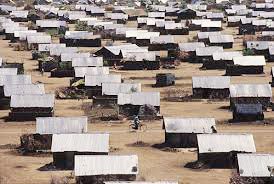From a distance, Felix Kakula doesn’t look like a man on the run. He could be a Botswana citizen waiting to board a taxi after knocking off from work in the capital city Gaborone. It is only when he recounts the details of his alleged crime that the truth emerges: he is part of refugees from Namibia who, in his own words, risk returning home to face possible prosecution.
Kakula’s fears follow a decision by the Court of Appeal declaring that over 700 Namibian refugees should be repatriated to their home country.
The court ruled in favour of the government of Botswana after the Attorney General appealed a decision of the High Court in which Tyson Mujela and 708 other refugees had interdicted the Gaborone authorities against deporting them.
Kakula said they are not refusing to return to Namibia but all they want is an undertaking from the Namibian government that they would not be persecuted and that they would be accepted as members of the banned opposition United Democratic Party (UDP).
He said the Court of Appeal judgement means that they are no longer refugees in Botswana but illegal immigrants.
“The Immigration Act is applicable to our situation and this means that as illegal immigrants deportation is the only solution for us. But the judgement does not consider the political conflict that led us to flee from Caprivi to Botswana,” Kakula explains.
He added: “It does not address the fact that we are willing to go back to Namibia but we need Namibian government to agree to peace talks with UNDP leadership.”
The Botswana government attempted to enforce a cessation clause with respect to the status of refugees living in Dukwi Camp in the north of the country, which was invoked in 2015 but failed.
The Gaborone authorities had given refugees up to 11 July 2018 to voluntarily repatriate or risk being deported forcibly.
But the refugees approached the High Court and successfully blocked the government from deporting them back to Namibia, pending the determination of a review application.
The court interdicted the government from carrying out its threat until reasons for their fleeing Namibia no longer existed.
The refugees are members of the UDP, which agitated for the secession of the Caprivi Strip from Namibia.
They later fled from their homeland and settled at Dukwi Refugee Camp after being granted refugees status.
The Attorney General later approached the Court of Appeal, arguing that the lower court had erred by granting the order against the Botswana government since there were no review proceedings pending.
But Mujela, through his lawyers Dingake Law Partners, had argued that the Attorney General was incorrect because the interdict sought was an interim in nature.
But the Attorney General insisted that the lower court was not supposed to grant the interim interdict because at the time Mujela and others were no longer recognised as refugees.
The Appeals Court this week agreed with the Attorney General that “in any event the cessation decision could only be challenged by way of a review as it was an exercise of public power by state officials and as such is time barred if brought four months after decision is made or after the conclusion of the proceedings complained of.
The Appeals Court also said the refugees spurned concerted efforts by the host country and other stakeholders who had wanted to assist those willing to voluntarily repatriate to do so without harassment from the Namibian authorities.
Exiled UDP leader Mishake Muyongo on Thursday said the court decision was wrong and did not consider the safety of his supporters.
“I would like to appeal firstly to the Government of Botswana to know that the Caprivians in Botswana are members of the UDP, whose leader is me in exile.”
He said deporting the refugees to Namibia is dangerous to their lives as many of their families are still in the Namibian prisons, “and that the Botswana Government should not participate in the acts of tormenting Caprivians vainly but for friendship’s sake.”
KO/jn/APA


